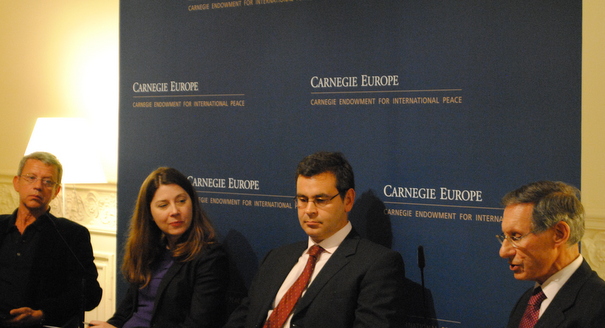Registration
You will receive an email confirming your registration.
IMGXYZ3693IMGZYXThere is widespread concern that an Iranian nuclear weapon could lead to an arms race, encouraging regional powers like Turkey, Egypt, and Saudi Arabia to explore their own nuclear option. Despite this worry, most nuclear-capable states have chosen not to develop a nuclear arsenal—and Turkey is no exception. What key considerations are likely to influence Turkey’s decision to proliferate? Will a nuclear-armed Iran change Ankara’s position?
To mark the launch of his new paper, Turkey and the Bomb, Sinan Ülgen addressed these issues with Carnegie’s Pierre Goldschmidt, and Bruno Tertrais of the Fondation pour la Recherche Stratégique. Eva Gross from the Institute for European Studies, moderated.
Event Highlights
- Turkey’s Relationship with Iran: The relationship between Turkey and the Islamic Republic of Iran is complex, Ülgen said. After centuries of uninterrupted peace, concerns of nuclear proliferation in Iran have sparked debate about how Ankara views its relationship with Tehran. Ülgen argued that Turkey does not perceive a nuclear Iran as a threat, but rather the regional consequences of a nuclear Iran.
- Sanctions Debate: Ülgen described Turkey’s opposition to U.S. and European sanctions against Iran as based on the belief that sanctions are a prelude to military intervention. Goldschmidt challenged this argument, asking “if we exclude military action, as we should, what is the alternative to sanctions when Iran refuses to comply with legally binding UN Security Council resolutions?
- Why Turkey Will Not Proliferate: Ülgen took a critical stance on the popular conclusion that, should Iran proliferate, a cascade of proliferation would sweep through the Middle East. He offered two chief reasons that Turkey will not proliferate:
- Turkey has a very good track record in terms of non-proliferation and has no incentive to undermine it.
- Turkey feels secure as a member of NATO and Turkey considers the deterrence offered by NATO when it calculates how to respond to a potential Iranian nuclear threat.
- Turkey has a very good track record in terms of non-proliferation and has no incentive to undermine it.
- The One Caveat: The only scenario that Ülgen thought might cause Turkey to consider nuclear proliferation would be if Turkey’s security relationship with the United States and, by extension, with NATO were to dissolve. Tertrais cautioned that it is one thing to assume no threat when devising hypothetical scenarios, but Ankara might feel differently if Iran were to get the bomb.
- Taking it Forward: Looking forward, Turkey has taken a lead on pushing for the creation of a Nuclear-Weapon-Free Zone in the Middle East within the Non-Proliferation and Disarmament Initiative (NPDI), set up after the Nuclear Security Summit in Washington, D.C. in 2010. Ülgen reflected on the recent NPDI meeting held in Istanbul, where Turkey displayed a willingness to take the confidence-building initiative forward. These initiatives aside, Ülgen insisted that Turkey’s unlikely decision to proliferate would only be because of enormous structural changes in the geopolitics that would affect the country’s future.
